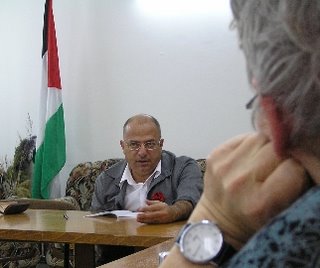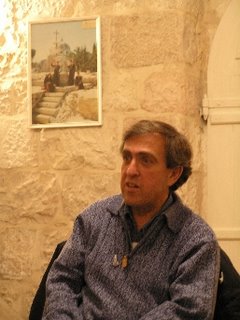Tuesday, November 01, 2005
Hope
The crossing across the Jordan River at the Allenby/King Hussein Bridge was the easiest one I've ever had. The Israelis have opened the two lines again - one for Arabs, one for everyone else. We breezed through, bypassing the security screening, x-raying, questioning, scrutinizing that the hundreds of Arabs faced. Many of them were on the plane with us from JFK. It's a tough thing to stomach - to be strongly opposed to such a discriminatory practice, but to benefit from it.
 Our first stop was in Jericho. The governor, Sami Musallem, is originally from Zababdeh. He has been part of the Palestinian national struggle for a long time, a man with a sharp mind and frank speech. He spared no criticism for anyone, including his own government, whom he said should have done more to reign in extremist elements. But it is clear that the larger obstacle he and all Palestinians face is the Israeli Occupation. While the town of Jericho is subject to the Palestinian Authority, 95% of the region Dr. Musallem governs is under total Israeli control. The area under Palestinian control is just the population area - not the agricultural or industrial lands which that population owns. What struck me most about this man was what he and others represent for the Palestinian leadership as a whole. Despite the corruption and cronyism, the Palestian Authority is peopled with academics, men and women with PhDs from abroad (Arafat, ever the revolutionary and symbol of Palestinian national aspirations, was the exception to this intelligensia). Meetings with sharp minds like Sami Musallem give me hope, despite the desperate situation they face and share. The question for me is whether the Israeli leadership will take advantage of this opportunity to work with those who could lead Palestine into a viable, hopeful, humane, thoughtful future - and, as a result, Israel as well - or whether they will continue to act unilaterally and thus give strength to Palestinian extremism?
Our first stop was in Jericho. The governor, Sami Musallem, is originally from Zababdeh. He has been part of the Palestinian national struggle for a long time, a man with a sharp mind and frank speech. He spared no criticism for anyone, including his own government, whom he said should have done more to reign in extremist elements. But it is clear that the larger obstacle he and all Palestinians face is the Israeli Occupation. While the town of Jericho is subject to the Palestinian Authority, 95% of the region Dr. Musallem governs is under total Israeli control. The area under Palestinian control is just the population area - not the agricultural or industrial lands which that population owns. What struck me most about this man was what he and others represent for the Palestinian leadership as a whole. Despite the corruption and cronyism, the Palestian Authority is peopled with academics, men and women with PhDs from abroad (Arafat, ever the revolutionary and symbol of Palestinian national aspirations, was the exception to this intelligensia). Meetings with sharp minds like Sami Musallem give me hope, despite the desperate situation they face and share. The question for me is whether the Israeli leadership will take advantage of this opportunity to work with those who could lead Palestine into a viable, hopeful, humane, thoughtful future - and, as a result, Israel as well - or whether they will continue to act unilaterally and thus give strength to Palestinian extremism?
We arrived in Jerusalem with time to rest and wander the Old City. I arrived at Damascus Gate as people hurried home for the end of today's Ramadan fast. The streets were soon empty. My "muscle memory" helped me navigate the back ways and shortcuts - I was surprised how much I (or rather, my legs) remembered. None of the folks I stopped by to visit were around, which gave me time to visit the Holy Sepulchre. The lines going into the tomb were long - longer than I had seen them in some time. The tourist trade has clearly picked up again. By the time I headed back to the hotel, the streets were vacant. Some merchants stood in their doorways munching on sandwiches or plates of traditional msakhan.
 Our final event of an already full day was a visit from Rami Alhanan, an Israeli who volunteers with Israeli Palestinian Families for Peace. The organization is for those who have lost children in the conflict, but use that pain as a moment of transformation. "I am angry. I am still angry," he shared with us. "But when speak with a class full of children and see one child nodding his head, I know that at least one drop of blood will be spared." Rami's story of losing his daughter to a suicide bomber is extremely powerful and moving - but his words are more eloquent than mine (follow the link to a World Vision interview with Rami). His closing words rang in our ears:
Our final event of an already full day was a visit from Rami Alhanan, an Israeli who volunteers with Israeli Palestinian Families for Peace. The organization is for those who have lost children in the conflict, but use that pain as a moment of transformation. "I am angry. I am still angry," he shared with us. "But when speak with a class full of children and see one child nodding his head, I know that at least one drop of blood will be spared." Rami's story of losing his daughter to a suicide bomber is extremely powerful and moving - but his words are more eloquent than mine (follow the link to a World Vision interview with Rami). His closing words rang in our ears:
I am the son of a Holocaust survivor. The world stood by and watched. Now, in this place, two people are killing each other. The world is standing by again, and even giving support to one side. But you, your presence, give us hope.
 Our first stop was in Jericho. The governor, Sami Musallem, is originally from Zababdeh. He has been part of the Palestinian national struggle for a long time, a man with a sharp mind and frank speech. He spared no criticism for anyone, including his own government, whom he said should have done more to reign in extremist elements. But it is clear that the larger obstacle he and all Palestinians face is the Israeli Occupation. While the town of Jericho is subject to the Palestinian Authority, 95% of the region Dr. Musallem governs is under total Israeli control. The area under Palestinian control is just the population area - not the agricultural or industrial lands which that population owns. What struck me most about this man was what he and others represent for the Palestinian leadership as a whole. Despite the corruption and cronyism, the Palestian Authority is peopled with academics, men and women with PhDs from abroad (Arafat, ever the revolutionary and symbol of Palestinian national aspirations, was the exception to this intelligensia). Meetings with sharp minds like Sami Musallem give me hope, despite the desperate situation they face and share. The question for me is whether the Israeli leadership will take advantage of this opportunity to work with those who could lead Palestine into a viable, hopeful, humane, thoughtful future - and, as a result, Israel as well - or whether they will continue to act unilaterally and thus give strength to Palestinian extremism?
Our first stop was in Jericho. The governor, Sami Musallem, is originally from Zababdeh. He has been part of the Palestinian national struggle for a long time, a man with a sharp mind and frank speech. He spared no criticism for anyone, including his own government, whom he said should have done more to reign in extremist elements. But it is clear that the larger obstacle he and all Palestinians face is the Israeli Occupation. While the town of Jericho is subject to the Palestinian Authority, 95% of the region Dr. Musallem governs is under total Israeli control. The area under Palestinian control is just the population area - not the agricultural or industrial lands which that population owns. What struck me most about this man was what he and others represent for the Palestinian leadership as a whole. Despite the corruption and cronyism, the Palestian Authority is peopled with academics, men and women with PhDs from abroad (Arafat, ever the revolutionary and symbol of Palestinian national aspirations, was the exception to this intelligensia). Meetings with sharp minds like Sami Musallem give me hope, despite the desperate situation they face and share. The question for me is whether the Israeli leadership will take advantage of this opportunity to work with those who could lead Palestine into a viable, hopeful, humane, thoughtful future - and, as a result, Israel as well - or whether they will continue to act unilaterally and thus give strength to Palestinian extremism?We arrived in Jerusalem with time to rest and wander the Old City. I arrived at Damascus Gate as people hurried home for the end of today's Ramadan fast. The streets were soon empty. My "muscle memory" helped me navigate the back ways and shortcuts - I was surprised how much I (or rather, my legs) remembered. None of the folks I stopped by to visit were around, which gave me time to visit the Holy Sepulchre. The lines going into the tomb were long - longer than I had seen them in some time. The tourist trade has clearly picked up again. By the time I headed back to the hotel, the streets were vacant. Some merchants stood in their doorways munching on sandwiches or plates of traditional msakhan.
 Our final event of an already full day was a visit from Rami Alhanan, an Israeli who volunteers with Israeli Palestinian Families for Peace. The organization is for those who have lost children in the conflict, but use that pain as a moment of transformation. "I am angry. I am still angry," he shared with us. "But when speak with a class full of children and see one child nodding his head, I know that at least one drop of blood will be spared." Rami's story of losing his daughter to a suicide bomber is extremely powerful and moving - but his words are more eloquent than mine (follow the link to a World Vision interview with Rami). His closing words rang in our ears:
Our final event of an already full day was a visit from Rami Alhanan, an Israeli who volunteers with Israeli Palestinian Families for Peace. The organization is for those who have lost children in the conflict, but use that pain as a moment of transformation. "I am angry. I am still angry," he shared with us. "But when speak with a class full of children and see one child nodding his head, I know that at least one drop of blood will be spared." Rami's story of losing his daughter to a suicide bomber is extremely powerful and moving - but his words are more eloquent than mine (follow the link to a World Vision interview with Rami). His closing words rang in our ears:I am the son of a Holocaust survivor. The world stood by and watched. Now, in this place, two people are killing each other. The world is standing by again, and even giving support to one side. But you, your presence, give us hope.
 Marthame Sanders lived in the Palestinian Christian village of Zababdeh with his wife Elizabeth from 2000 to 2003.
He is a Presbyterian minister and president of Salt Films.
Marthame Sanders lived in the Palestinian Christian village of Zababdeh with his wife Elizabeth from 2000 to 2003.
He is a Presbyterian minister and president of Salt Films.